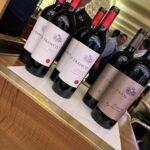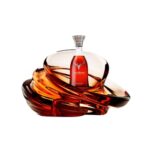 Phylloxera – Want to sound smart? Throw out this tidbit I stole from class: The grape Phylloxera/aphid/louse succinctly took out all of France’s wine growing when they used our vine cuttings there in the 1850s. Our little bug, that our vines were resistant too, ate their way through French vines. They had to either rip out the plants or burn then. Then, we saved the French wine-growing community by sending them our resistant plants to start again and they grafted ours to theirs.
Phylloxera – Want to sound smart? Throw out this tidbit I stole from class: The grape Phylloxera/aphid/louse succinctly took out all of France’s wine growing when they used our vine cuttings there in the 1850s. Our little bug, that our vines were resistant too, ate their way through French vines. They had to either rip out the plants or burn then. Then, we saved the French wine-growing community by sending them our resistant plants to start again and they grafted ours to theirs.
Clones – Just like that cat that was cloned for the sake of its cat-widowed-human, DiMaggio has a Syrah cutting from France now growing in his vineyard. He says the genetic instructions that are copied are very accurate.
Expensive Barrels – One barrel can cost $1100 and they are constructed in facilities called cooperages. The most popular producers of oak barrels are French, Hungarian and American. (The American ones come mostly from Arkansas where the climate is cold enough for the oak to age slowly.) Upon close inspection of the barrels in The Cellar’s classroom, DiMaggio showed us the stamped marks that we’d largely ignored before, designating things like: Lightly Toasted (LT), Medium Toast Plus (MT+) and the town where the oak came from.
Some winemakers may only use a barrel for one season and then resell it to another winemaker. The oak becomes neutral in time, and depending on what the winemaker is trying to achieve, is used or discarded as seen fit.
Sweetness from Brut Zero to Deux Luscious – Keep in mind when shopping for Champagne that Brut nature, or Zero, is the least sweet, then, in growing degrees of sweetness comes Extra Brut, Brut, Sec, Demi Sec and then, finally Deux. DiMaggio told us that Deux has the equivalent of a teaspoon of sugar per glass and a whopping 1/8 of a pound in a bottle.
Tannins – The word tannin is often used as a wine descriptor for what DiMaggio called, “the bitterness and cotton dry feel in the mouth.” It occurs due to the amount of time the grape skin was left on and the amount of pressing. Less pressing equals less tannins and the wine is usually enjoyed young. More pressing means more tannins, and the wine might benefit from laying down/aging in bottle. The time in the cellar will allow the preservatives/tannins to soften and the wine to blossom.
Bordeaux NOT from France – When Chilean winemakers took a Bordeaux grape varietal back home, in this case it was the Carmenere grape, their label says Carmenere. In Argentina, the same was done with Bordeaux’s Malbec grape. The wines are simply labeled as Malbecs in Argentina. (And they must be doing a good job at winemaking as Argentina has become the 5th largest wine producing country in the world.)
What I tell people that if they want to save money, try something new and favor Bordeaux, to try these two new world varietals.
Prohibition’s “Do Not” labeling – During the U.S. 14 year hiatus from alcohol, that cost us – in DiMaggio’s opinion – from holding the #1 wine producing spot in the world, there were two ways people were still getting wine. They were either affiliated with the Catholic Church that depended on wine for religious purposes…or they got it in the mail.
The astute wine drinker could get boxed grape juice, which was accompanied by some handy yeast as well, via mail order. Each box had specific “Do Not” instructions about combining the two…but…oh well. It was sold as a “food product” to bypass prohibition laws.
If you are curious about the wines we tasted in class see my post on 6/3/11. And if you are thirsty for more tasty tidbits about wine call DiMaggio so you can get some class: 661-799-7979.







Here is a little more information on Phylloxera. When the grapes in Europe where almost extinct they came to the united stated for vine graphs specifically TEXAS. So next time the FRENCH get a little snooty about how much better french wines are…REMEMBER who saved there ass. AGAIN! 🙂
Thank you Tony! Love getting more Phylloxera news! (Especially your comment as it was buried in 6 other pages of pure spam messages.)